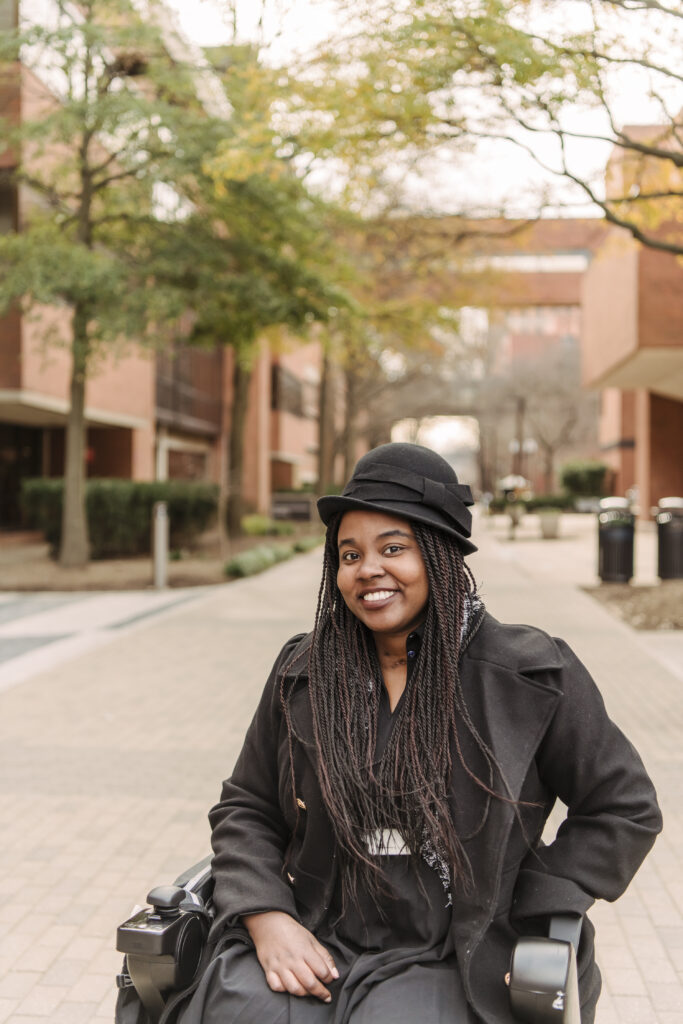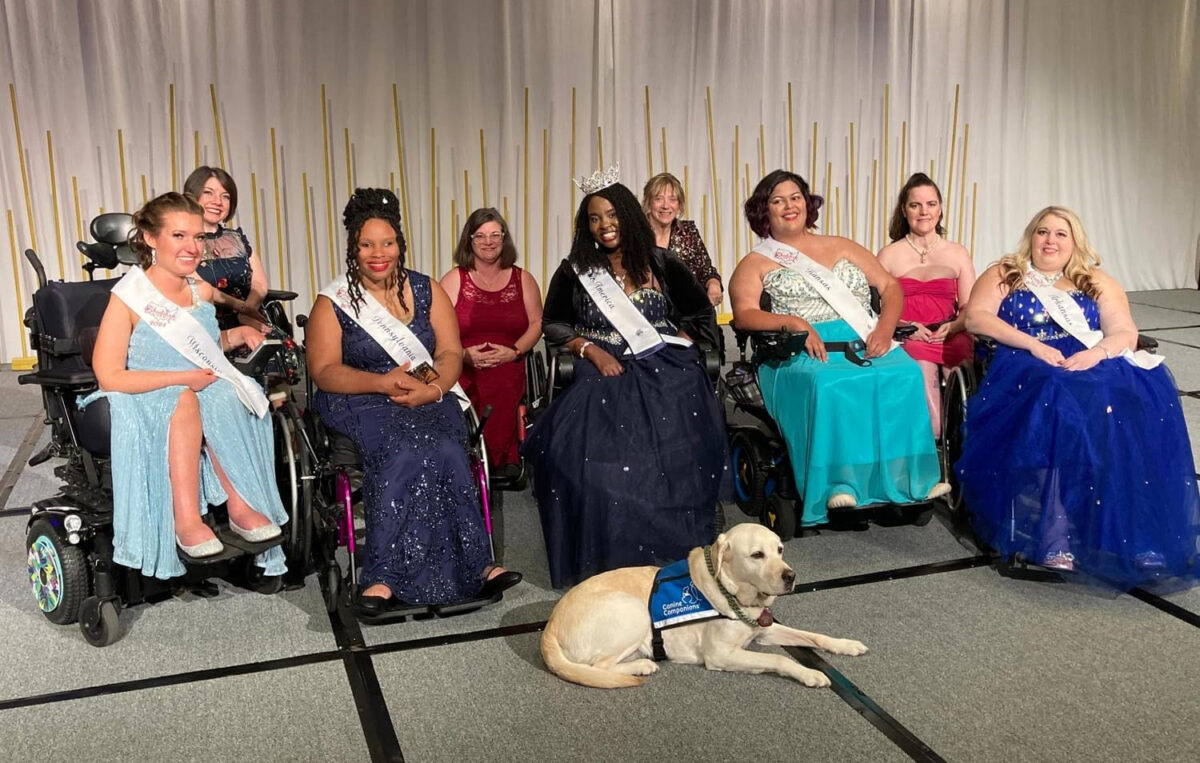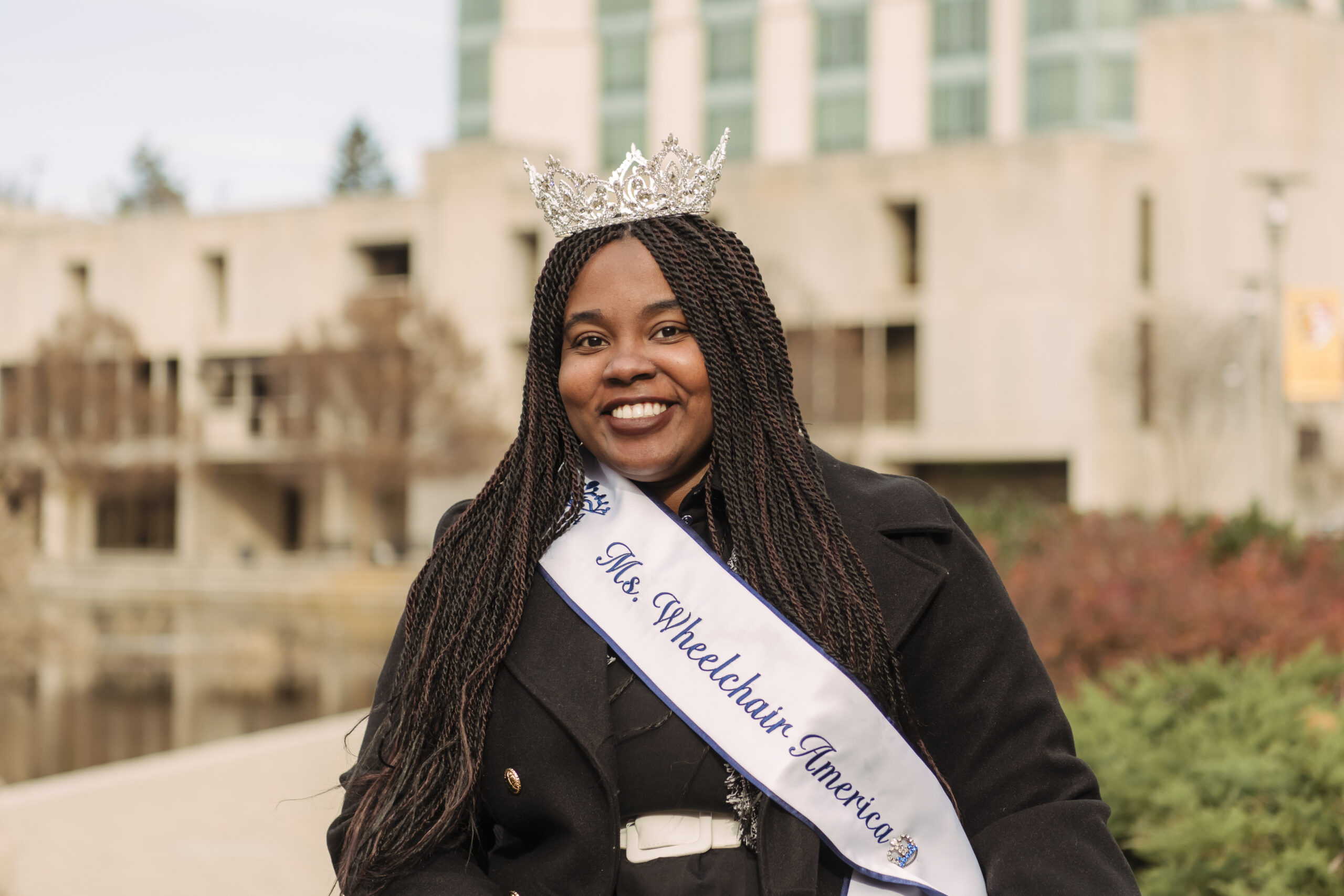It’s 4 a.m. on a Wednesday—earlier than most people rise, though a preference for Chandra Smith, M.S. ’21, information systems. After saying her daily devotion, she begins to get ready for the day ahead: brushing her teeth, taking a shower, getting dressed and having some breakfast.
If she’s lucky, the day ahead is one where her employer’s “reasonable accommodations” for her disabilities allow her to work from home rather than having to schedule a Paratransit bus pickup near Baltimore, then get on the Marc train to D.C., then get picked up by another Paratransit bus to take her to work at the Defense Intelligence Agency: a process that takes several hours—each way—assuming the bus even shows up, which doesn’t always happen.

Everything Smith does now, even previously simple tasks such as getting dressed, have become complicated, time-consuming, and in her words, “close to an Olympic sport,” ever since Chandra’s Life As She Knew It screeched to a halt in the fall of 2021 when she fainted after fasting for religious purposes. She was medevaced to Georgetown University Hospital, when her body started shutting down, and then she was pumped with medicines to keep her organs functioning.
While life-saving, the emergency medicine she was given caused blood from her extremities to move to her core, essentially causing medical burns on 25 percent of her body and sepsis, triggering yet another medical emergency.
When a doctor told her she had 10 minutes to decide whether she wanted to live or die—with one small caveat: she’d be a triple amputee—Smith chose life.
She would go on to clock one year and one day from entering the hospital to exiting it, experiencing along the way: a stroke, dialysis, severe liver ketosis, three amputations, 10 painful surgeries (on one foot alone), and a host of other medical issues, procedures, and therapies.
Little did Smith know then, but the master’s degree in information systems she received from UMBC earlier that year would soon position her for a new role, a new voice and, ultimately, a new mission, not just within her job at the Defense Intelligence Agency (DIA), but in life.
“An upfront and center seat”
At age 32, Smith wasn’t looking for the campus-immersion experience she’d had when she was younger. “UMBC’s online masters program was the perfect mix of everything I wanted,” Smith says. Easy access to courses, professors with real-world experience, and fellow students from many walks of life and many parts of the world made picking UMBC an easy choice for Smith.
“I felt like I had an upfront and center seat in the field I was studying, as my professors wove challenges they faced in their jobs into the class instruction,” Smith says. Though, when reflecting on her experience at UMBC, the connections with other students stood out as most memorable to her.
“As I continued in the program, I often found myself in classes with people I’d met and worked with in previous classes,” she says. “To this day, I still come across people I recognize from the program when attending various professional conferences and events.”
A door opens
Long cloaked behind a “national-security exemption,” the nation’s seven intelligence agencies—including Smith’s employer, the DIA—had in recent years started addressing the complications of providing accessible technologies for disabled employees who needed what are called “reasonable accommodations” in order to do their work. This issue was particularly complex for those whose work involved top-clearance activities. For the DIA, a key area of concern was making sure their internal website met federal accessibility standards and requirements for online content.
The agency needed an IT engineer who could review various technologies used by employees—such as a Bluetooth hearing device for deaf or hard-of-hearing employees who need to access sensitive compartmented Information rooms or voice-to-text tools for someone with limited hand mobility. The official could then grant approval to use these technologies in national intelligence and top-secret environments. Smith, with her new degree in information systems, was the only person in her department with the skills to do this work.

“The job just fell in my lap after I graduated,” Smith says, who notes that in this “before” version of her life, she saw the position as important, but it had yet to become personal to her. “As I dove in, I found the field and challenges fascinating in that I had to balance significant national-security concerns with the legitimate and legally compelling needs for people with various disabilities to be given ‘reasonable accommodations’ to do their intelligence-related work.”
And then things became personal
Only several months after earning her master’s degree, Smith experienced her medical trauma and began her year-long hospital stay of surgeries, occupational therapy, and recovery—including six months in the burn unit. But in the midst of this, Smith found time to apply for a higher government position, received the promotion, and came back to the DIA a notch up in her career, with more fire in her than ever and now positioned as a team lead, mentor, and accessibility policy creator.
“It’s one thing to try and think like someone who has various disabilities,” Smith says. “It’s another thing to be that person: to be a triple amputee and someone who, essentially, doesn’t have functioning appendages.” (Her one remaining appendage—her right hand—was rendered near-useless and stiff when she had a stroke in the hospital.) “There are so many more nuances and deeper levels of understanding about universal design and accessible technology I understand now because I have to face these hurdles and challenges myself.”
“At UMBC, I felt like I had an upfront and center seat in the field I was studying, as my professors wove challenges they faced in their jobs into the class instruction.
In her new role, she still advocates for expanded definitions of reasonable accommodation hardware and software for employees, but now Smith gravitates toward policy and agency-wide mandates. And she’s creating change not just at the DIA, but across all the nation’s intelligence agencies. “I’m absolutely and avidly an advocate for universal design and making these technologies available to more people.”
Smith has had to advocate for herself and her own needs, too, including a desk printer she can access from her wheelchair, a sit-to-stand desk, working from home for a significant portion of the week, voice-recognition software, speech-to-text software, and a policy change for the need to provide biodata such as fingerprints. She asks, “How can someone provide a fingerprint if they don’t have a hand?”
There she is …
Of all the things a younger Smith never saw in her future, being crowned Ms. Wheelchair America 2024 was certainly one of them.

But after her medical trauma, she was encouraged to compete in the Ms. Wheelchair Maryland 2023 contest, which she won; and that title allowed her to compete nationally, which she also won. More of a competition about resilience, advocacy, and helping to eliminate architectural and attitudinal barriers people with disabilities experience in the world, Smith’s response was, “I can do that!”
“The contest judges and members of the board were quite taken with Chandra’s presence, the clarity and logic with which she advocates about universal design, her personal story and challenges… and coming out all the stronger,” says Shelly Loose, president of Ms. Wheelchair America.
“Even before I was so personally impacted by these workplace and daily accessibility challenges of being disabled,” says Smith, “I could already see how designing for the few helps the many.”

For example, closed captioning of videos for hearing-impaired people helps many others with improved comprehension and retention. Ramps into buildings help people in wheelchairs and parents with strollers. “Universal design is inclusive. It should be the starting point, not an afterthought,” Smith says.
Maryland Governor Wes Moore heard of Smith’s work after she testified for a Prince George’s County universal-access bill. Soon after, he appointed her to a three-year term on the Maryland Commission on Disabilities, where she’s already working on accessibility policy recommendations to support a variety of disabilities. “We just recommended rewriting the MVA manual to a 6th-grade level to accommodate those with learning and reading disabilities,” Smith says. “Disabilities manifest in many ways—seen and unseen.”
Architecture and attitudes toward accessibility
For as much as Smith and others advocate for universal design and reasonable accommodations at work, at the end of the day, people and their attitudes about their peers with disabilities are the biggest hurdle to overcome, she says.
When Smith returned to work after her medical trauma, one coworker said, “If that happened to me, I’d kill myself.” Another one asked, “Do you know you’re missing a leg?”
Eyes rolled but mind set, Smith plows on. “There aren’t many people who look like me in a military-focused work environment, as most people who are disabled or use a wheelchair are discharged and don’t return to their former jobs,” she says.
While Smith has suffered quite a few “slings and arrows of outrageous fortune,” as Shakespeare put it, she knows the way forward is, well, forward. “When I was an able-bodied person, I had some bad days. As a disabled person, I have some incapacitating days. But I’ve come to understand that having difficult days doesn’t make a bad life. I appreciate more things now. I have more gratitude,” Smith says.
“I know it’s cliché and a bit corny, but if I help one employer add voice-to-text software for their employees or one property manager install a ramp for a building, I’ve done my job,” Smith says. “Universal design is a core value; it’s a perspective; it’s a way of seeing the world and making things accessible for all because—and I can speak from experience here—being disabled is a club anyone can join at any moment for any reason.”

